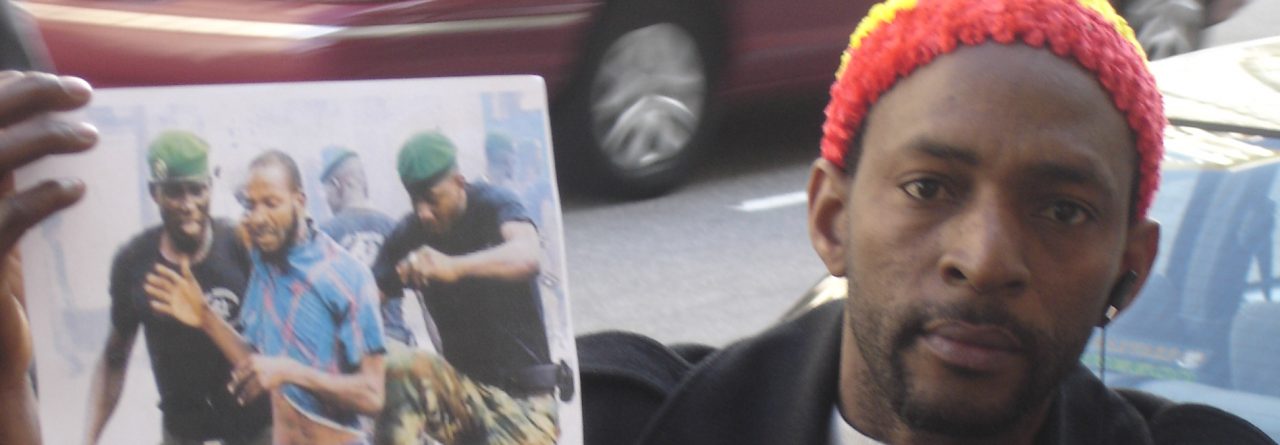Link to French version appears after the English version
Dangerous Game: Guinea’s President Plays the Ethnic Card

Source: Présidence de la République de Guinée
Two months ago, I warned that unless the international community steps up quickly to pressure the incumbent regime in Guinea to achieve a consensus with the political opposition and civil society regarding the sequencing and scheduling of the elections constitutionally required less than six months from now, the West African country’s belated and fragile democracy might well prove stillborn. Last month, I noted that there were alarming signs that tribal tensions were being stoked and that, in a region where ethnic groups transcend borders which themselves are all-too-porous, such a conflict will be impossible to contain. Now these worst fears are being confirmed by the actions of Guinea’s President Alpha Condé.
Guinea has extraordinary potential for prosperity and, indeed, wealth, thanks to its prodigious natural resources (including the largest bauxite reserves in the world). Moreover, unlike some of its neighbors, it does not want for water: the country has, in fact, been described as the “château d’eau d’Afrique de l’Ouest” because of the many great rivers—including the Niger, the Senegal, and the Gambia—which flow from its highlands. But for all these endowments, the country has seen precious little development, ranking a miserable 179th place among 187 countries in the most recent edition of the Human Development Index published by the United Nations.
The incumbent head of state, Condé, who came to power in disputed elections in 2010, has given voters few compelling reasons to award him a second and final term in the presidential election scheduled for October 11. Both urban and rural poverty have increased during the president’s tenure according to his own finance ministry’s report to the International Monetary Fund. The country faces a multimillion-dollar action in a U.S. federal court seeking to enforce a May 2014 decision by the Common Court of Justice and Arbitration, the highest tribunal of a sixteen-member African regional body on commercial law to which Guinea belongs, ruling that the Condé regime illegally ripped up a port management contract with French cargo company, Getma International. Aside from the nearly $50 million judgment against the government, the harm to the country’s reputation with desperately needed foreign investors is incalculable. And all this was before military and security forces started firing on protesters who, in recent weeks, have regularly been gathering peacefully in the capital of Conakry to support opposition demands for a free, fair, and transparent electoral process.
Absent positive achievements of note, it is not surprising that the embattled leader might turn to a crass appeal to ethnic divisions. Although precise numbers are hard to come by absent a reliable census since colonial times, it is generally estimated that the 11.5 million Guineans are roughly divided between the Peul (or Fulani) with some 40 percent of the population, the Malinké with about 30 percent, the Sousou with around 20 percent, and various smaller groups who make up the remaining 10 percent. Since independence in 1958, the country has been governed by three Malinké (Ahmed Sékou Touré, 1958-1984; Sékouba Konaté, 2009-2010; and Alpha Condé, 2010-present), a Sousou (Lansana Conté, 1984-2008), and a Guerze from the Forest Region (Moussa Dadis Camara, 2008-2009). Despite the group’s numerical plurality, no Peul has ever been president, although a good case might be made that opposition leader, former Prime Minister Cellou Dalein Diallo, who handily won the first round in the 2010 election had the race stolen from him in the run-off despite an electoral pact with the third-place finisher, former Prime Minister Sidya Touré, who threw his support behind him.
This sets the context for the crass tribal appeal Condé made this past weekend when he flew to Kankan, Guinea’s third-largest city and the center of the Malinké lands. There he was warmly welcomed by the regional governor, Nawa Damey, who is best known for having used his position as minister of territorial administration in the interim government during the 2010 election to put in as head of the national electoral commission Louceny Camara between the two rounds of voting and to pressure local government officials to throw their weight behind Condé’s candidacy in the run-off; his prize was an appointment by the new leader as head of this key bastion. Responding to the governor’s welcome, Condé pandered to the massive crowd of supporters with a nearly forty-minute speech, an audio recording of which I received from a friend in Guinea. What was most disconcerting about the discourse, however, was Condé’s opening and the enthusiastic response it received: “Si vous avez accepté le gouverneur Nawa Damey, alors qu’il est forestier, c’est parce que la Guinée appartient aux malinkés, aux forestiers et aux soussous!”
“Guinea belongs to the Malinké, to those from the Forest Region, and to the Sousou!” No mention of the Peul, the country’s largest ethnic group. A cynical, possibly even rational, political play, to be sure, but certainly not the statesmanship one would expect of a man who would be president of a multiethnic country—at the very least it is a highly irresponsible gambit in one of Africa’s most volatile and fragile subregions, one just recovering from long years of conflict, recently afflicted by Ebola, and currently on edge with an uptick in Islamist militancy coming out of the Sahel. We have seen the seeds of this type of poisonous tribalism sown before elsewhere in Africa and the harvest is always unfailingly bitter. The international community had better start paying more attention to the dangerous game that Alpha Condé is playing before it is too late.
J. Peter Pham is Director of the Atlantic Council’s Africa Center. Follow the Africa Center on Twitter at @ACAfricaCenter.
Link to French version:




